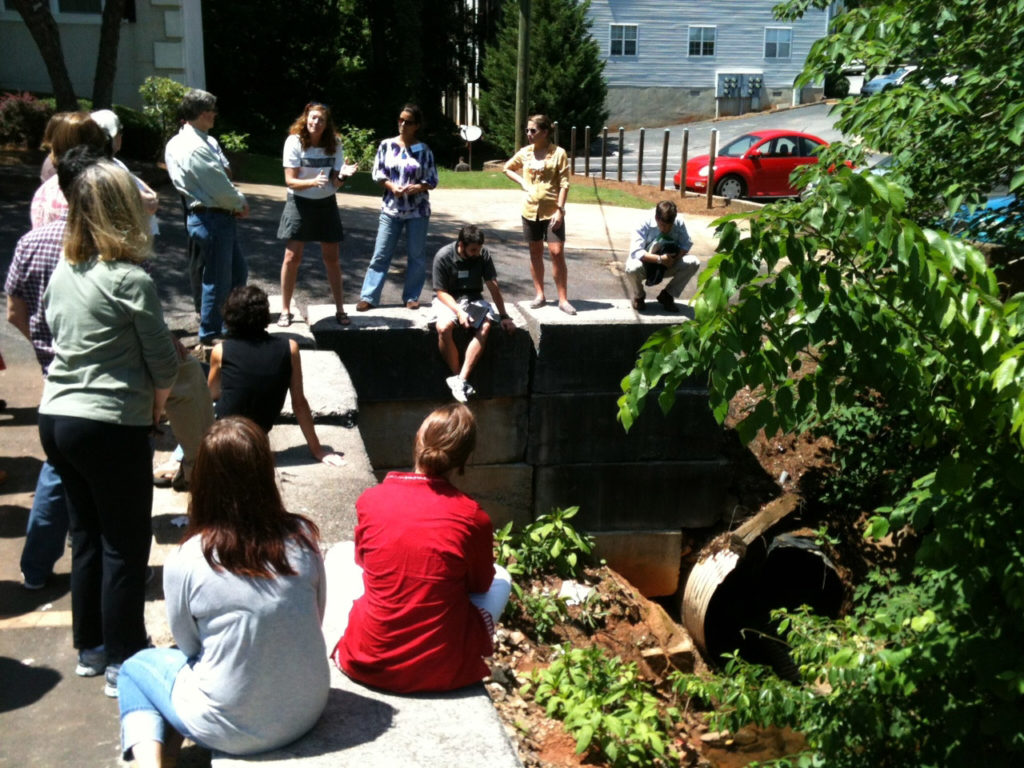It’s more than just a plastic fork. In the middle of an ocean of one-use items, forgoing a plastic fork doesn’t seem like it would have much of an impact. But after taking “Introduction to Environmental Health Science”—EHSC 3060 in the UGA Bulletin—Anne Marie Zimeri’s students no longer look at the disposable utensil the same way.
“Sometimes people think what they do doesn’t make a difference,” said Zimeri, who is an assistant professor and undergraduate coordinator in the College of Public Health. “They’ll say it’s just one plastic fork. But then we calculate how many they use over the course of a week—and how much oil it takes to make these forks—and students begin to see where they can make a difference.”
Students majoring in environmental health science are a natural fit for the subject of sustainability, whether it’s related to meat consumption, agricultural practices, transportation, water use or waste reduction. Learning about these topics through Zimeri’s classes and others in the college is part of their degree requirements.
So when Zimeri wanted to reach a new audience in the form of incoming UGA freshmen, she turned to the university’s Office of Sustainability. In May 2012, she joined the first group of faculty participating in an initiative known as Sustainability Across the Curriculum.
“It was incredible,” she said. “I met a lot of faculty interested in sustainability. I didn’t realize before that there was so much interest on campus.”
She came out of the two-day workshop with her syllabus ready to go and “some really specific ideas for my class,” she said.
Now when new UGA students are choosing a First-Year Odyssey seminar, they have the opportunity to enroll in Zimeri’s “Environmental Film Festival” course, which combines her love of documentary films with an overview of the topics she teaches in EHSC 3060.
Zimeri is one of 39 faculty members who have completed the Sustainability across the Curriculum Faculty Development Workshops. Held annually since 2012, the workshop will welcome its third cohort in May.
“The workshop is designed as a bit of a retreat,” said Tyra Byers, the program coordinator in the Office of Sustainability who oversees the workshop. “We want to take the faculty outside of their normal environments and just give them that time and space they need to think, collaborate and reflect.”
Faculty members meet at Founders Memorial Garden and House on Lumpkin Street and start day one with definitions and examples of sustainability. They then go into an overview of ways to incorporate it into their classes and, after lunch, take walking tours of campus. They finish the day by breaking into groups and discussing how to integrate sustainability into their courses.
On day two, faculty members start applying their new knowledge through the development of learning outcomes and more ideas for student engagement.
Once the workshop is over, faculty members have the summer to turn in their homework. And instead of being graded on their revised or rewritten syllabi, each receives a $500 faculty development award.
“If we can weave sustainability throughout the curriculum, then students are better equipped when they graduate to help ensure quality of life in the future,” Byers said.
Back in Zimeri’s First-Year Odyssey seminar, she’s leading her students on a speed-walking tour of the Town Spring, which bubbles up between the Business Services Annex, the Tanner Building and one of the parking lots included in zone N04. From there, she takes them along the edge of the stream-pointing out dumpsters, scattered trash and other pollution sources-until they reach the North Oconee River.
“It’s fun to get out of the classroom and show them the water source and how it can become contaminated on its way to the river,” she said. “I completely repurposed the idea from the workshop, from one of the tours we took.”
The Sustainability Across the Curriculum workshop is coordinated and run by the Committee for the Integration of Sustainability Across the Curriculum administrated by the Office of Sustainability with support from the Odum School of Ecology, the Center for Teaching and Learning and the Office of the Vice President for Instruction.
